 “We pray you in Christ’s stead, be ye reconciled to God. For he hath made him to be sin for us, who knew no sin; that we might be made the righteousness of God in him.” (2 Corinthians 5:20-21)
“We pray you in Christ’s stead, be ye reconciled to God. For he hath made him to be sin for us, who knew no sin; that we might be made the righteousness of God in him.” (2 Corinthians 5:20-21)
This sums up the gospel in just a few lines. Christ died on our behalf, paying a debt He did not owe, the one we owed but could not pay. On the cross, Jesus took our sins on himself, and God treated Jesus as if he had lived our lives. All our sinful thoughts, dishonest deeds, and selfish ways were put upon Christ and he was punished as if they were his own thoughts and deeds and ways.
“But he was pierced  for our transgressions, he was crushed for our iniquities; the punishment that brought us peace was upon him, and by his wounds we are healed.” (Isaiah 53:5.) Jesus was our substitute; he took our place on the cross, but just as importantly, He gave us His righteousness. In the eyes of God we have the very righteousness of Christ Himself. So because Jesus went to the cross undeservedly, we go to heaven undeservedly. But wait, it is not underserved because it is now as though we have lived Jesus’ life! Our rap sheet is as white as snow- there is nothing there. “He himself bore our sins in his body on the tree, so that we might die to sins and live for righteousness; by his wounds you have been healed” (1 Peter 2:24).
for our transgressions, he was crushed for our iniquities; the punishment that brought us peace was upon him, and by his wounds we are healed.” (Isaiah 53:5.) Jesus was our substitute; he took our place on the cross, but just as importantly, He gave us His righteousness. In the eyes of God we have the very righteousness of Christ Himself. So because Jesus went to the cross undeservedly, we go to heaven undeservedly. But wait, it is not underserved because it is now as though we have lived Jesus’ life! Our rap sheet is as white as snow- there is nothing there. “He himself bore our sins in his body on the tree, so that we might die to sins and live for righteousness; by his wounds you have been healed” (1 Peter 2:24).
 In a wonderful but heartbreaking book by Ernest Gordon, Miracle On The River Kwai, he tells stories of courage among the Scottish soldiers who were forced by their Japanese captors to labor on a jungle railroad. Over 80,000 men died in the construction of the railroad, over 350 deaths per mile of railroad built. Under the strain of captivity, brutality, and starvation the men had degenerated to barbarous behavior. But as is the case in every critical situation, men of character rose to the occasion. In the midst of the daily degrading conditions, acts of sacrifice and love influenced the camp. On one occasion a man who seemed near death had his blanket stolen and his meager rations stolen. A man named Agnus gave him his own blanket and everyday would take a portion of his rations to give to the weak and emaciated man. As the man grew stronger, Agnus grew weaker until the man had recovered…but Agnus had died. Men who watched the daily sacrifice were deeply moved
In a wonderful but heartbreaking book by Ernest Gordon, Miracle On The River Kwai, he tells stories of courage among the Scottish soldiers who were forced by their Japanese captors to labor on a jungle railroad. Over 80,000 men died in the construction of the railroad, over 350 deaths per mile of railroad built. Under the strain of captivity, brutality, and starvation the men had degenerated to barbarous behavior. But as is the case in every critical situation, men of character rose to the occasion. In the midst of the daily degrading conditions, acts of sacrifice and love influenced the camp. On one occasion a man who seemed near death had his blanket stolen and his meager rations stolen. A man named Agnus gave him his own blanket and everyday would take a portion of his rations to give to the weak and emaciated man. As the man grew stronger, Agnus grew weaker until the man had recovered…but Agnus had died. Men who watched the daily sacrifice were deeply moved 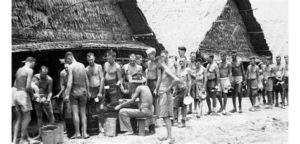 by the act of selfless love.
by the act of selfless love.
However, it was another man whose act of sacrifice succeeded in changing the hearts and minds of the camp as a whole. One afternoon in the daily tool count a shovel was found missing. The officer in charge demanded that the shovel be returned and the culprit show himself. 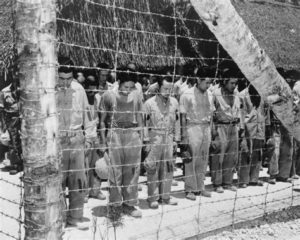 When no one came forward the officer threatened to kill everyone on the spot and he walked up to the first man in line and put a gun to his head. Immediately a man stepped forward from the line admitting guilt. The officer beat the man with his gun and then with a shovel and then ended his tirade by kicking the lifeless body over and over. When he was done, the soldiers picked up their bloody friend and carried him away. As they did the shovels were counted again. No shovel was missing. Indeed, there had been a miscount the first time. The man, seeing the situation was futile, sacrificed himself for the rest of his comrades.
When no one came forward the officer threatened to kill everyone on the spot and he walked up to the first man in line and put a gun to his head. Immediately a man stepped forward from the line admitting guilt. The officer beat the man with his gun and then with a shovel and then ended his tirade by kicking the lifeless body over and over. When he was done, the soldiers picked up their bloody friend and carried him away. As they did the shovels were counted again. No shovel was missing. Indeed, there had been a miscount the first time. The man, seeing the situation was futile, sacrificed himself for the rest of his comrades.
The word spread like wildfire through the whole camp and the incident had a profound effect. . . The men began to treat each other like brothers. When the victorious Allies swept in, the survivors, human skeletons, lined up in front of their captors and instead of attacking them or insisting on their deaths they said that death and hatred must be left behind and replaced 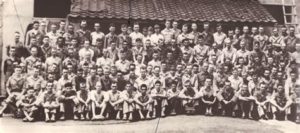 by forgiveness. Only sacrificial love has that kind of transforming power. We, ourselves, can experience that transforming power. Though sacrifice at Kwai was great beyond imagination, the greatest act of sacrificial love was when Jesus stepped forward for crimes he did not commit and hung in our stead on a lonely cross on Calvary. If the sacrifice of one soldier could change a camp, surely the sacrifice of Christ on the cross should change the whole world. At the least, it should change each of us.
by forgiveness. Only sacrificial love has that kind of transforming power. We, ourselves, can experience that transforming power. Though sacrifice at Kwai was great beyond imagination, the greatest act of sacrificial love was when Jesus stepped forward for crimes he did not commit and hung in our stead on a lonely cross on Calvary. If the sacrifice of one soldier could change a camp, surely the sacrifice of Christ on the cross should change the whole world. At the least, it should change each of us.
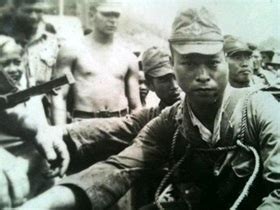 Although the above story is a impactful one, there is one important difference. We have stolen the shovel and Christ still steps in and takes our punishment. Jesus steps in before we are frisked and are caught dead to rights. He becomes the thief for us and stops the search and saves our lives.
Although the above story is a impactful one, there is one important difference. We have stolen the shovel and Christ still steps in and takes our punishment. Jesus steps in before we are frisked and are caught dead to rights. He becomes the thief for us and stops the search and saves our lives.
In 2 Corinthians 5:20-21 Paul begs us to be reconciled 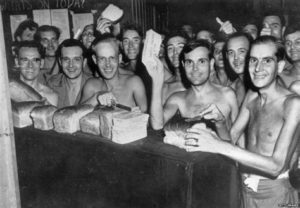 to God, for God has done the impossible and a way has been made for us- corrupt and faulty sinners that we are – to have complete, unhindered access to and communion with the holy God. God’s wrath (which should have been reserved for us) was spent on Christ. His death brought (and brings) reconciliation to all who believe on Him. This is the message we must spread, both through our words and deeds. Any other message we can share pales in the light of this great truth.
to God, for God has done the impossible and a way has been made for us- corrupt and faulty sinners that we are – to have complete, unhindered access to and communion with the holy God. God’s wrath (which should have been reserved for us) was spent on Christ. His death brought (and brings) reconciliation to all who believe on Him. This is the message we must spread, both through our words and deeds. Any other message we can share pales in the light of this great truth.
Leave a Reply